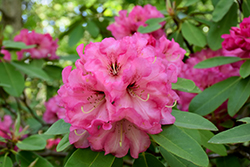It's all about ...
plants

Pink Parasol Rhododendron
Rhododendron yakushimanum 'Pink Parasol'
Height: 3 feet
Spread: 5 feet
Sunlight:
![]()
![]()
Hardiness Zone: 6a
Brand: Monrovia
Description:
A showy, broadleaf evergreen rhododendron presenting two-toned pink and white blooms in spring over dense, blue-green leaves; best with some shelter, absolutely must have well-drained, highly acidic and organic soil, use plenty of peat moss when planting
Ornamental Features
Pink Parasol Rhododendron is blanketed in stunning clusters of lightly-scented pink trumpet-shaped flowers with white overtones at the ends of the branches from mid to late spring, which emerge from distinctive rose flower buds. It has bluish-green foliage with tan undersides. The narrow leaves turn an outstanding coppery-bronze in the fall, which persists throughout the winter.
Landscape Attributes
Pink Parasol Rhododendron is a multi-stemmed evergreen shrub with a mounded form. Its relatively coarse texture can be used to stand it apart from other landscape plants with finer foliage.
This is a relatively low maintenance shrub, and should only be pruned after flowering to avoid removing any of the current season's flowers. It has no significant negative characteristics.
Pink Parasol Rhododendron is recommended for the following landscape applications;
- Accent
- Mass Planting
- General Garden Use
Planting & Growing
Pink Parasol Rhododendron will grow to be about 3 feet tall at maturity, with a spread of 5 feet. It tends to be a little leggy, with a typical clearance of 1 foot from the ground. It grows at a slow rate, and under ideal conditions can be expected to live for 40 years or more.
This shrub does best in full sun to partial shade. You may want to keep it away from hot, dry locations that receive direct afternoon sun or which get reflected sunlight, such as against the south side of a white wall. It requires an evenly moist well-drained soil for optimal growth, but will die in standing water. It is very fussy about its soil conditions and must have rich, acidic soils to ensure success, and is subject to chlorosis (yellowing) of the foliage in alkaline soils. It is somewhat tolerant of urban pollution, and will benefit from being planted in a relatively sheltered location. Consider applying a thick mulch around the root zone in winter to protect it in exposed locations or colder microclimates. This is a selected variety of a species not originally from North America.
This plant is not reliably hardy in our region, and certain restrictions may apply; contact the store for more information.
